SF in South Korea Today, an article by Gord Sellar.
Before the article, a caveat: I am not yet much of an expert on Korean SF. In order to write this article, I have relied upon the knowledge of others, most particularly Ms. Jeong So-Yeon, an award-winning translator and author whom I interviewed one evening in February. Most of the information here is courtesy of Ms. Jeong, and other members of the Korean SF community, especially Mr. Park Sang Joon. Any errors, misconceptions, or exaggerations herein ought to be blamed on me, however.
###
Science fiction has existed in Korean translation since 1907, when a group of Korean science students living in Japan and publishing an academic journal titled Taeguk Hakbo translated and adapted Jules Verne’s 20,000 Leagues Under the Sea, which they published as a serial titled A Strange Story About Traveling Under the Sea.[i] This was about the same time, and in vaguely similar circumstances, to the first translation of Western SF into Chinese, by Lu Xun — who also translated Jules Verne. But while SF has amassed an enormous following in China — this fact created quite a stir in the SF-blogosphere last year — the SF scene in Korea is relatively modest.
The reasons for this seem to be relatively complex, so much so that I’m devoting most of my academic study to this area, but probably boil down to historical circumstances, culture, and the particular political situation that South Korea endured during the 20th century, a set of circumstances that have also profoundly shaped literature in general in South Korea.
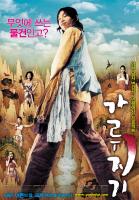
The fact is that 20th century Korean fiction was, very often, gloomy stuff. Older Korean literature ranged from bizarre and fantastical mythology (such as certain tales found among Korea’s various Three Kingdoms narratives) to bawdy ribaldry (as in texts like the Garoojigi, a folk narrative recently made into a feature film), and from literary eclecticism (such as the fascinating genre of literary miscellanies — collections of mini-essays, translations, reminiscences, and translations from Chinese literature like this one — that grew popular during the Joseon Dynasty (1392-1910)) to religious and moral narratives (like The Cloud Dream of the Nine or the Buddhist pilgrimage narrative The Hye Ch’o Diary). In stark contrast, a great deal of celebrated twentieth-century Korean literature focused often on issues of identity, of cultural integrity, of loss and pain and suffering related to modern Korean history, especially the experience of being a Japanese colony from 1905-1945, and of the Korean War and the resulting split of the two Koreas, a split which divided families and which remains a national preoccupation today.
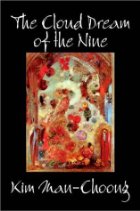
When I first arrived in South Korea, I clearly remember reading an article in a local English newspaper highlighting the tensions between younger writers, who were dealing with subject matter familiar to them from daily life — romantic relationships, work, contemporary politics, and recent history — and older authors who sternly criticized them for failing to write about what seemed to become the default (and almost the only) suitable topic for literary work in the South: the trauma of the Korean war and the division between North and South Korea. To anyone who has even casually read South Korean mainstream fiction, the standard metaphors quickly become familiar: stories feature loss of memory, broken families whose final reunion symbolizes the reunification of Korea, returns to ancestral villages, and mysterious disappearances within families, workplaces, or communities. A lot of it is gloomy, grim stuff.
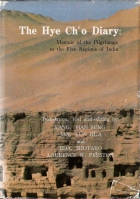
Part of this is a result of the way the postcolonial dictatorships (and the intellectuals they employed in rebuilding the education system after the Japanese left in 1945) went about building national identity. Han, a supposedly untranslatable word describing a mixture of unbearable burden which cannot be cast aside, a sense of resignation, and the pain of terrible suffering, has been elevated in a profound sense to the level of a keyword in Korean identity now.
I have been assured more than once that this is new to Korean literature, which was, pre-1900, much more diverse. (And even prior to World War II, authors such as Yi Sang — a penname appropriately homophonic to the Korean word for “strange” or “weird” — also experimented a great deal, not feeling bound to discuss only the colonial experience and nothing else.) In the postwar era, Korean literature focused on the past, probably as much out of the urgent sense of a need to build a national identity in the face of grinding poverty, a postcolonial social complex, the near-complete leveling of their monuments and cities, and probably as a way of avoiding the dire repercussions for any criticism of the dictatorships that ran South Korea from after the war until near the end of the 1980s.
In this literary environment, SF remained marginal for many years, in a sense understandably because Korea was, after all, pretty much a medieval society into which little of the outside world had penetrated prior to the Japanese occupation, and which remained mostly agrarian until modernization campaigns throughout the 1960s, 70s, and 80s. There were attempts to use SF as bait for interesting children in science and technology, and such titles as I, Robot, The Day of the Triffids, and The Time Machine (as well as a smattering of Star Trek novelizations) were translated into Korea for kids to read. (For a more complete list of titles, check out this webpage, where many works are available, probably illegally, in PDF format.) The books included texts added by (if I recall correctly — the PDFs don’t display on my PC so I cannot check for sure) the Ministry of Science and Technology highlighting the importance of science and technology in Korea’s development, and suggesting the connection between this concern and SF as an enticement to study science.
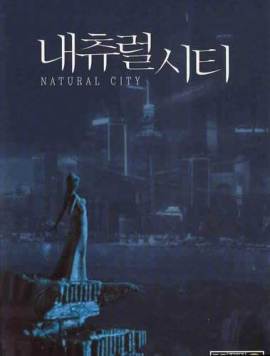 But while this probably did hook some young readers during their Golden Age (that is, the age of 12 years old) it also helped to build a sense among Koreans, persistent even in the present, that SF was really “kid stuff” or “junk” in terms of its literary merit. While certain authors (notably Bok Geo-il, though he certainly was not the only one) experimented with SFnal themes and tropes, they (importantly, according to award-winning translator/author Jeong So Yeon) did not consider themselves as SF writers. According to Ms. Jeong, the phenomenon of “SF authors” in Korea is relatively new, dating back to the late 90s at the earliest. Even today, mainstream literature is called soon moonhak (literally “pure literature”), a field from which SF is excluded on the basis of its relative “impurity.”[ii]
But while this probably did hook some young readers during their Golden Age (that is, the age of 12 years old) it also helped to build a sense among Koreans, persistent even in the present, that SF was really “kid stuff” or “junk” in terms of its literary merit. While certain authors (notably Bok Geo-il, though he certainly was not the only one) experimented with SFnal themes and tropes, they (importantly, according to award-winning translator/author Jeong So Yeon) did not consider themselves as SF writers. According to Ms. Jeong, the phenomenon of “SF authors” in Korea is relatively new, dating back to the late 90s at the earliest. Even today, mainstream literature is called soon moonhak (literally “pure literature”), a field from which SF is excluded on the basis of its relative “impurity.”[ii]
All of this goes some way to explaining why people I talked to about the theme of optimism in SF tended to talk more regarding optimism about the growth of SF as a literary field in the Korean market — the hope that the genre could grow in popularity, that fandom could build up in size and in its scope, and the desire to increase the translation of foreign SF into Korean for eager readers.
Ms. Jeong had very interesting things to say also about the specifically Korean sense of a notion like “optimism,” related to the different social construction of optimism and the specifically Korean understanding of what problems make literary sense. For example, she noted that in Korean SF, it’s much more common for the narrative problem to focus on something domestic, something specifically Korean, such as the education system. (Contrary to what President Obama thinks, pretty much everyone in Korea sees the public school system here as rife with problems that both dire are difficult repair. Perhaps the best book on the subject in English is Michael J. Seth’s Education Fever.)
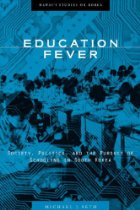
Jeong pointed out — and it resonates well with my experience in the classroom and in social situations — that Koreans tend to be primarily interested in problems of national concern: South Korea’s broken education system is, socially, a much higher priority than global warming, and the result according to Jeong is that characters who are concerned with globally pressing problems come across to Korean readers as unbelievable or unrealistic. Thus, the themes that predominate Korean SF — even in stories of alien invasion, like “Proxy War,” a locally well-known novella[iii] by a South Korean cyberpunk writer going by the penname Djuna — seem to resonate mostly with local, national issues of concern, and not the “big problems” that an anthology like Shine or the Mundane SF movement urges SF authors to tackle.
(More SF at the same Crossroads site where “Proxy War” was published, which hosts pretty much the only collection of Korean SF in currently available in English translation, can be found here.)
Moreover, according to Jeong there’s a certain sort of sensibility that is particularly Korean, in which characters are likely to try solve a problem but end up finding it insoluble. The solution may arise, but more as a matter of chance or luck, or of some change in the system beyond the schemings of would be problem-solvers. (One case Jeong cited was, I think, from her own writing, about how a crippled astronomer finally got a chance to become an astronaut, but only because the government realized that physically handicapped people made for lighter payloads on space missions. In another story by another author, she described how teacher found a way to free the children from the shackles of the schoolroom and of alien mind — an apt metaphor for Korean educational problems — but only by sending his students into outer space.) The sense of people surrendering and throwing their hands up in resignation in the face of intractable problems is a very Korean aesthetic, probably a result of historical circumstances and one may suppose a habit learned under long dictatorships; this is optimism in a society without a truly utopian social tradition, and a society only now beginning its third decade of ostensible democracy.
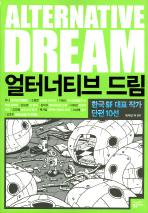 Despite the fact that SF tropes are well-enough known to have become part of the popular political discourse in South Korea (see my article in Clarkesworld on the subject), SF remains relatively marginal here. As a result, the lines between professionals and fans are extremely blurry, and the cross-pollinating influences are still quite profound, something I find really refreshing and invigorating. Make no mistake: economics does enter into the picture, but passions are also a powerful driver for the way Korea’s native form of SF is taking shape. There are, for example, currently two major fan clubs I’ve come across: JoySF and Mirror.
Despite the fact that SF tropes are well-enough known to have become part of the popular political discourse in South Korea (see my article in Clarkesworld on the subject), SF remains relatively marginal here. As a result, the lines between professionals and fans are extremely blurry, and the cross-pollinating influences are still quite profound, something I find really refreshing and invigorating. Make no mistake: economics does enter into the picture, but passions are also a powerful driver for the way Korea’s native form of SF is taking shape. There are, for example, currently two major fan clubs I’ve come across: JoySF and Mirror.
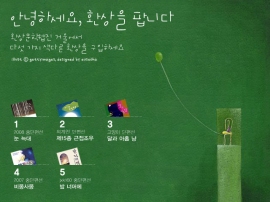 I don’t wish to draw too-broad lines between the two, since overlap exists. However, to put it simply, JoySF is dominated by male fans and has a stronger focus on military SF or space opera, while Mirror has a larger number of female fans and tends to focus on SF with a social component, as well as fantasy. (I’m much less familiar with Mirror than with JoySF, in part because I’ve had a chance to attend a festival run by JoySF but not one by Mirror.) These two groups aren’t necessarily inimical to one another: Mirror set up a table and sold books at the JoySF festival I attended, and members of both groups gathered at the recent launch of a fan-stocked SF lending library in Seoul last month. The fact that more female fans are involved in Mirror also means a greater interest in fantasy, which is (it must be said) a genre that has far more successfully been popularized in Korea; and like everywhere, the dominant buyers of books are young women, who are rather more likely to be interested in fantasy or social SF than young Korean men. Both groups publish small-print material, zines and otherwise, in addition to more elaborate productions. But even points of overlap, they are somewhat separate organizations, with their own websites and social networks.
I don’t wish to draw too-broad lines between the two, since overlap exists. However, to put it simply, JoySF is dominated by male fans and has a stronger focus on military SF or space opera, while Mirror has a larger number of female fans and tends to focus on SF with a social component, as well as fantasy. (I’m much less familiar with Mirror than with JoySF, in part because I’ve had a chance to attend a festival run by JoySF but not one by Mirror.) These two groups aren’t necessarily inimical to one another: Mirror set up a table and sold books at the JoySF festival I attended, and members of both groups gathered at the recent launch of a fan-stocked SF lending library in Seoul last month. The fact that more female fans are involved in Mirror also means a greater interest in fantasy, which is (it must be said) a genre that has far more successfully been popularized in Korea; and like everywhere, the dominant buyers of books are young women, who are rather more likely to be interested in fantasy or social SF than young Korean men. Both groups publish small-print material, zines and otherwise, in addition to more elaborate productions. But even points of overlap, they are somewhat separate organizations, with their own websites and social networks.
Still, fan energy has been harnessed to achieve some amazing things in the recent past. For example, the establishment of the Seoul Science Fiction & Fantasy Library started out when one fan decided to find a place where he could offer his personal library — including many books that have gone out of print and are not really available anymore, even in libraries — for public lending. A real lending library including several hundred texts (not just fantasy and SF novels but also science books, books on RPG gaming, and more) and many hundreds of comic books, as well as other resources, was established basically using this one fan’s collection, supplemented by astounding numbers of book donations and/or purchases made with money donations. The library opened for business in March 2009, with a ceremony that, instead of featuring the traditional lucky pig’s severed head, had a talking Darth Vader helmet as the donations table centerpiece.
Likewise, the strong sense of identity within fandom is giving rise to other interesting projects, such as one academic association which is being formed at present to work in the area of the translation, study, and publication of Korean SF in English, of which I am lucky enough to have been invited to be a part. (The organization is so new that it hasn’t got a name or a website yet, but at the first meeting, the others I met there were simply bursting with interest in the project, and with spreading the word about an SF naissance going on in Korea.) One important dynamo of activity is Park Sang Jun, the publisher of the Omelas book imprint that specializes in SF, and has recently produced stunningly packaged Korean translations of novels by authors like Lem and Stapledon; he is so actively involved in the SF scene here that he seems to be in ten places at once, from organizing film screening series and workshops to launching the aforementioned new academic association and speaking at science fiction events; his tireless efforts have contributed to almost every SF-related event I have attended in Korea.
Fandom also plays a massively important role in the building of the SF canon in Korea, both in terms of foreign works in Korean translation, and in terms of the development of domestic Korean SF. As stated earlier, the line between pros and fans is very blurry: many people I have been introduced to as fans also turned out to be aspiring translators or authors, and several well-regarded authors are also translators and ardent fans themselves. The reputation-economics that determines the success of foreign SF in translation is a topic I’m researching right now, specifically looking at how authors like Ted Chiang, Roger Zelazny, and Ursula K. Le Guin have achieved popularity here; each of these authors seems (to me) to occupy a slightly different position within the Korean SF canon than in his or her own language — a position interestingly contextualized not by other major SF authors that surround them in English, but by other factors such as the reputations of those who have translated their work, and the care and attention that their texts have been given by dedicated translators who work so energetically in part because of their own ardent fandom of that particular author’s work. Likewise, fandom supports younger authors by publishing their work in zines and allowing them to build a reputation that will springboard them into the world professional publication.
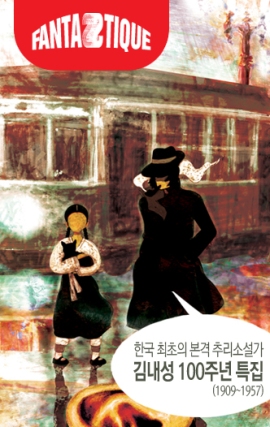
No doubt, Korean SF is still growing, and growing pains are inevitable, especially at the present time; the economic situation here is, if less profound than in the USA at the moment, nonetheless having pronounced effects on the publishing industry. For example, the (beautiful colorful, 300-page-thick) monthly SF magazine Fantastique — which launched in 2007 and offered regular translations of foreign SF and fantasy as well as new work by Korean authors, reviews, historical overviews, current-events columns with an SFnal twist, and more — has recently shifted from monthly to quarterly publication.
Likewise, book-publishing is hurting everywhere in the world, and translators with whom I’ve spoken have expressed anxiety about their recent translations of new-to-Korea authors, because if the first book by a “new” author fails to garner enough sales, later translation proposals are unlikely to be accepted. (A disappointing example of this is Greg Egan’s work: despite ardent admiration of his writing among a small minority of Korean SF fans, the Korean-language translation of Quarantine unfortunately seemed to garner too little general interest to warrant further translations of Egan’s oeuvre, as one Egan-fan complained to me.) Besides, Korean SF authors are struggling to adapt SF — a genre that is, if not about science, at least deeply informed by science, to a society that I have heard (and read) Korean SF translators complain is not so interested in science as it is in the tangible trappings of modernity. Korea is, after all, a society whose scientists and engineers are, it is often said, less respected and valued than are its doctors, lawyers, and even its celebrities. (There are exceptions, of course, but there is a pronounced lack of interest in science, and parental encouragement into other areas — including government bureaucratic work — is only one reason.)
But thanks to the efforts of fans, publishers, authors, and translators — and a dedicated core of people playing several of those roles simultaneously — SF in Korea is definitely on the move, growing and developing, adapting to this new environment just as any immigrant must do in order to thrive in an unfamiliar new land. The various people I’ve met who are involved in the scene are so energetic, devoted, and active that I have little doubt that the literature of the future has a bright future here.
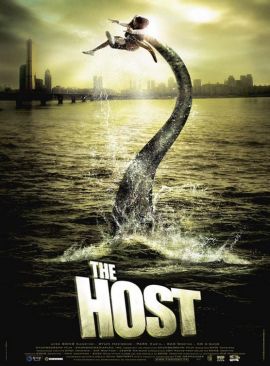 For more on other aspects of Korean SF — such as cinematic SF in Korea, festival/con reports, SF-related Korean rock music, the success of the Raelian UFO cult in Korea, and more — readers might want to check out the series on the subject at my blog, which begins here.
For more on other aspects of Korean SF — such as cinematic SF in Korea, festival/con reports, SF-related Korean rock music, the success of the Raelian UFO cult in Korea, and more — readers might want to check out the series on the subject at my blog, which begins here.
#
Gord Sellar
(NB: edited April 14 with the replacement of a manga (Japanese) picture with “Alternate Dreams” picture, the addition of two movie posters (“The Host” and “Natural City”), and the correct romanisation of Mr. Park Song Joon’s name.)
[i]According to columnist, archivist, and SF publisher Park Sang Jun in his article “Science Comes to Life For All” (Beyond: Korean Air, November 2008).
[ii]Indeed, readership of books in general in Korea seems to be shaped by older prejudices against fiction and towards “useful” nonfiction: a visit to any Korean bookstore will surprise Westerners, who will find a much larger proportion of nonfiction to fiction than in conventional Western bookstores. In the Preface to his translation of A Korean Storyteller’s Miscellany (Princeton University Press: Princeton, 1989), Peter H. Lee explains:
In [pre-modern] Korea, the traditional prose narrative, whether fictional or not, was deemed unofficial because it created a world other than that sanctioned by the court and offered an alternative view of reality. This social and cultural ordering of the Confucian society is mirrored in the spatial taxonomy. The East Asian term for the fictional narrative, sosŏl (hsiao-hsun in China and shōsetsu in Japan), literally “small talk,” stems from this prejudice against any writing that was viewed as unofficial by the custodians and censors of the dominant culture. (x)
Sosŏl is the term that is still used for both novels and short stories in contemporary Korean literature.
[iii]“Proxy War” was expanded into a novel of the same name, but the novel has not yet been translated to English. Indeed, as far as I have been able to discover, no Korean SF novel has yet been translated to English. The narrative focuses on how an alien sex-tour industry based in a satellite city of Seoul goes badly wrong, along the lines of an alien invasion and outbreak of war, but the story, at least in the novella, plays this trope out in uniquely Korean ways, and to highly comical effect.












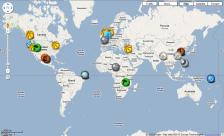




















Leave a comment